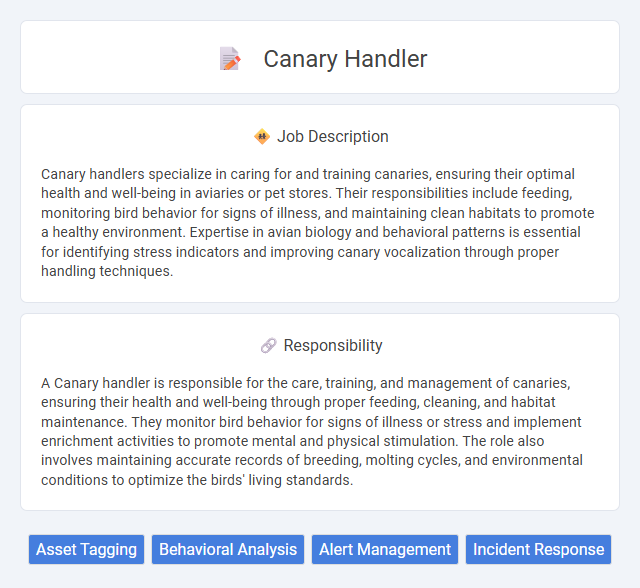
Canary handlers specialize in caring for and training canaries, ensuring their optimal health and well-being in aviaries or pet stores. Their responsibilities include feeding, monitoring bird behavior for signs of illness, and maintaining clean habitats to promote a healthy environment. Expertise in avian biology and behavioral patterns is essential for identifying stress indicators and improving canary vocalization through proper handling techniques.
Individuals with strong organizational skills and attention to detail are likely to be well-suited for a Canary handler job. Those who can work comfortably in physical environments involving animal care and maintenance will probably adapt quickly to the role. People who may struggle with patience or dislike repetitive tasks might find this position less suitable.
Qualification
A Canary handler must possess strong knowledge of avian biology, animal behavior, and health management to ensure optimal care. Qualifications typically include experience in animal handling, a background in veterinary assistance or zoology, and skills in habitat maintenance and behavioral monitoring. Proficiency in safety protocols and record-keeping is essential for effective management and welfare of Canaries.
Responsibility
A Canary handler is responsible for the care, training, and management of canaries, ensuring their health and well-being through proper feeding, cleaning, and habitat maintenance. They monitor bird behavior for signs of illness or stress and implement enrichment activities to promote mental and physical stimulation. The role also involves maintaining accurate records of breeding, molting cycles, and environmental conditions to optimize the birds' living standards.
Benefit
Canary handlers likely experience significant physical and mental health benefits due to regular outdoor activity and interaction with animals. The job may improve attention to detail and observational skills, enhancing cognitive function over time. Career-wise, handlers probably enjoy stable employment opportunities within environmental and pest control sectors.
Challenge
The Canary handler job likely involves managing delicate animals that require precise care and attention, presenting a challenge in maintaining their health and well-being. Coordinating feeding schedules, monitoring behaviors, and ensuring a safe environment may demand consistent vigilance and adaptability. This role probably tests patience and expertise to handle unpredictable situations effectively.
Career Advancement
Canary handlers gain valuable experience in avian care, migration tracking, and habitat maintenance, key skills for advancing into wildlife rehabilitation or environmental research roles. Mastery of species-specific behaviors and health monitoring techniques often leads to supervisory positions or specialized conservation projects. Continuous professional development through certifications and fieldwork enhances opportunities for leadership within zoological institutions or ecological consultancy firms.
Key Terms
Asset Tagging
Canary handlers play a crucial role in asset tagging by accurately labeling and tracking canaries used in environmental monitoring and mining operations. Effective asset tagging ensures that each canary's location, condition, and usage history are meticulously recorded for safety compliance and data integrity. This process enhances the management of avian assets, reducing loss and optimizing operational efficiency.
Behavioral Analysis
Canary handlers specialize in behavioral analysis to monitor and interpret the subtle actions and reactions of canaries under varying environmental conditions. They utilize observational techniques and data recording to detect stress indicators, mood changes, and overall health status, enabling early identification of potential issues. This role demands expertise in avian psychology and proficiency in behavioral assessment tools to ensure optimal care and well-being of the birds.
Alert Management
Canary handlers specialize in alert management by monitoring system health and promptly identifying anomalies through automated alerting frameworks. Their role involves configuring, prioritizing, and escalating alerts to reduce false positives and ensure critical incidents receive immediate attention, optimizing operational efficiency. Effective alert management by canary handlers minimizes downtime and supports rapid incident response within IT environments.
Incident Response
A Canary handler in Incident Response manages honeypot systems designed to detect unauthorized access and cyber threats early by mimicking real assets. They analyze alerts generated by Canary devices, correlate data with other security tools, and coordinate with SOC teams to contain and mitigate potential breaches. Effective handling reduces incident response times and strengthens overall network security posture.
 kuljobs.com
kuljobs.com